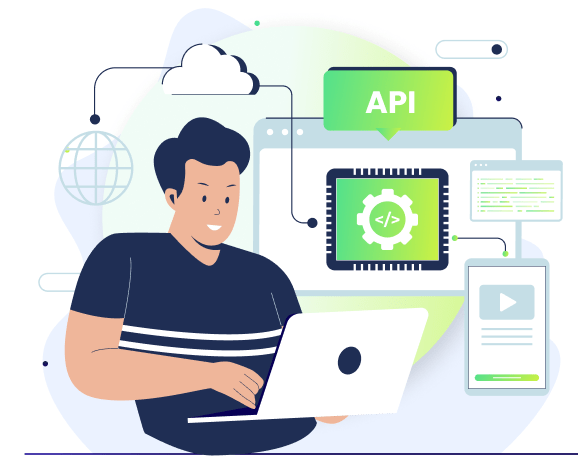Zero Complexity API Testing (Part II): Breaking Down Barriers with AI in API Testing

Welcome to the second part of Zero Complexity API Testing!
We hope you had a chance to read the Part I. If not, you can read it here: Zero Complexity API Testing (Part I): Why API Test Services Should Be Priority #1
A Quick Recap:
The “Zero Complexity API Testing” is a three-part blog series that highlights the vital importance of API testing, breaks down barriers with AI, and unlocks new possibilities in the future of API Testing.
We all have questions about API testing automation. Some of the basics, like “What is API testing process?” or “Can you QA test on APIs?” are readily available off the internet. This blog series dives much deeper into the nuances of API testing with the help of a real-life scenario.
In Zero Complexity API Testing—Part I, we covered the critical role of API testing and the challenges faced by UI testers moving to API testing. We saw how Emily, a lead tester at a rapidly growing e-commerce company, faced an API glitch that caused frustration and confusion among the customers. In spite of knowing what the API testing process is, Emily chose to make it an optional process, leading to a panic situation.
In Part II (this blog), we’ll discuss how Emily’s team could have avoided the above situation with Qyrus’ codeless testing capabilities for APIs. We’ll discuss how Qyrus simplifies the creation and execution of API tests, making them accessible to non-technical testers.
The blog also covers AI in API testing and Qyrus’ support for codeless assertions, API specification imports, data-driven testing, API chaining, and AI-assisted assertions. Additionally, it mentions Qyrus’ ability to perform performance testing with massive loads.
Overall, the blog emphasizes how Qyrus empowers teams to efficiently test their APIs, ensuring their functionality, reliability, and performance.
Let’s examine how Emily could have used Qyrus, an API testing tool, to overcome her team’s challenges.
Codeless Testing for APIs
One of the standout features of Qyrus is its ability to enable codeless testing for APIs. This feature allowed Emily’s team to create and execute API tests without writing a single line of code. The intuitive interface meant that even the most non-technical testers could quickly get up to speed. This democratized API testing, making it accessible to everyone on her team.
With Qyrus, setting up an API test is as simple as selecting the API endpoint, specifying the request parameters, and defining the expected response. This simplicity ensures that Emily’s team can quickly create comprehensive test cases without getting bogged down in technical details.
Codeless Assertions
Adding assertions for headers, body, JSON Path, and schema was as simple as clicking a few buttons. This ensured that the API responses met the expected criteria without the need for complex scripts. Emily’s team could easily verify that the APIs were returning the correct data and behaving as expected, significantly improving test coverage and reliability.
Qyrus provides a user-friendly interface for defining assertions. Testers can specify expected values for headers and response bodies, check JSON Path expressions, and validate response schemas. The platform also supports complex assertions, such as verifying nested JSON structures and checking for the presence of specific keys and values.
Importing API Specifications
Qyrus supports importing API specifications through OpenAPI Spec/Swagger doc, Postman Collection, or manual entry. This flexibility allowed Emily’s team to get started with their existing API documentation quickly. They could import API specs effortlessly and begin testing immediately, saving valuable time and effort.
By importing API specifications, Qyrus automatically generates test cases for each endpoint, complete with sample requests and expected responses. This automation accelerates the test creation process and ensures that all endpoints are thoroughly tested.
Data-Driven API Testing
Qyrus enabled data-driven testing, allowing her team to use external data sources to drive API tests. This ensured that APIs were tested under various conditions, improving overall test coverage. Emily’s team could simulate different scenarios and data inputs, ensuring the robustness of their APIs.
With data-driven testing, Qyrus allows testers to define test data sets in CSV or JSON format and link them to API test cases. This enables comprehensive testing with multiple data variations, such as different user profiles, transaction amounts, and order details.
API Chaining and Data Plumbing
Qyrus allowed the team to chain APIs together, passing data from one API to another. For instance, a JSON Path value from one API could be used as a header in the following API. This capability simulated real-world API interactions and workflows, enhancing the robustness of their tests. Emily’s team could test complex API interactions seamlessly, ensuring their system worked end-to-end flawlessly.
API chaining in Qyrus enables testers to create end-to-end test scenarios that mirror real-world usage. For example, a test case might involve creating a new user account, adding items to a shopping cart, and processing a payment—all within a single, cohesive test.
Beyond Functional Testing – The AI and Performance Edge with Qyrus
AI-Assisted Assertions
One of the most powerful features of Qyrus is its AI-assisted assertions. The AI model in Qyrus analyzed API responses and suggested appropriate assertions, speeding up the test creation process and ensuring comprehensive coverage. This was a game changer for Emily’s team, who could now focus on more critical testing tasks while the AI handled the mundane, repetitive aspects of test creation.
Qyrus’s AI engine leverages machine learning algorithms to analyze API responses and identify key data points. It then suggests assertions based on common patterns and expected values, reducing the time and effort required to create comprehensive test cases. This intelligent automation ensures that no critical validation is overlooked.
Performance Testing with Massive Loads
With Qyrus, Emily’s team could run performance tests on the same APIs without any changes. The cloud-based infrastructure of Qyrus leveraged the elasticity of the cloud to run performance tests with massive loads, ensuring that APIs could handle high traffic. This feature allowed Emily’s team to ensure that their APIs were not only functional but also scalable and performant under heavy loads.
Qyrus supports performance testing by simulating thousands of concurrent users and generating high volumes of requests. Testers can define performance criteria, such as response time thresholds and error rates, and monitor the API’s performance under different load conditions. Qyrus provides detailed performance reports, highlighting any bottlenecks and areas for improvement.
Support for Multiple API Types
Qyrus supports GraphQL, REST, and SOAP APIs, with Kafka support coming soon. This broad compatibility meant that Qyrus could be used across different projects and technology stacks within Emily’s company. Regardless of the API technology they used, Qyrus provided a unified platform for testing.
Qyrus’s multi-protocol support ensures that testers can seamlessly switch between different API types without learning new tools or workflows. Regardless of the underlying API technology, the platform’s consistent interface and feature set simplify the testing process.
Qyrus’ API Discovery Chrome Plugin
Qyrus’ API Discovery Chrome plugin was a revelation. It helped Emily’s team extract relevant APIs from their web application, generate assertions, and export them as test suites in Qyrus API testing. This feature turned manual web testing into a source of automated API tests, significantly improving test coverage and efficiency.
The API Discovery plugin integrates directly with the Chrome browser, allowing testers to capture API calls made by the web application during manual testing sessions. Based on the captured data, the plugin automatically generates test cases and assertions, streamlining the transition from manual to automated testing.
Sneak Peek into Part III: Future of API Testing – Unlocking New Possibilities
Now that Emily’s team has transformed its API testing approach with Qyrus, it can focus on the overall quality of its e-commerce platform.
By leveraging AI-assisted assertions and advanced features, Qyrus empowered them to achieve more in less time. With enhanced test coverage, scalable performance testing, and efficient test maintenance, Qyrus unlocked new possibilities for Emily’s team.
Stay tuned for Part III, where we talk about the future of API testing and uncover new possibilities in the testing space. Try the Freemium version now to experience the power of fast and insightful API automation testing!





